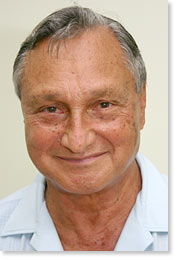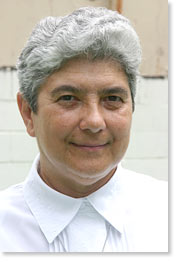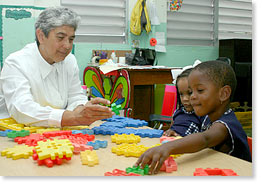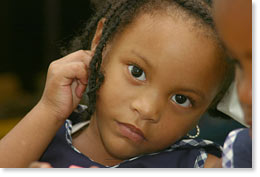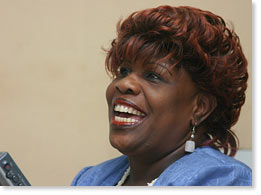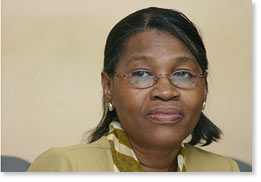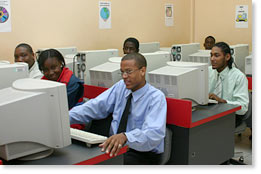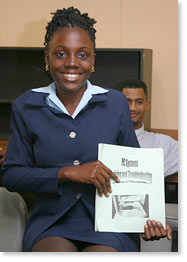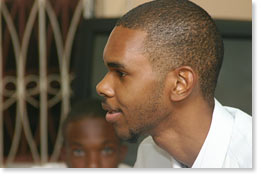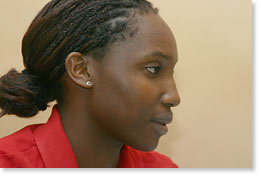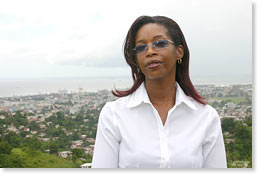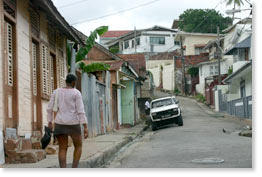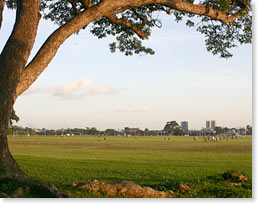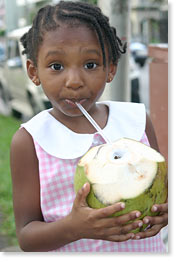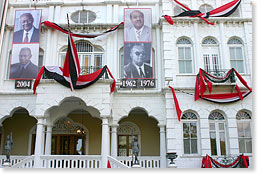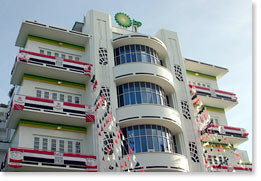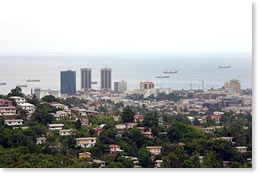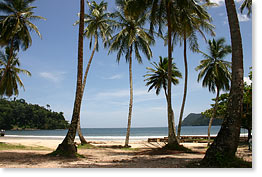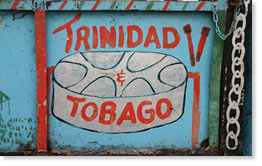|
Interviews with Father Pantin and Sister Ruth of SERVOL Taking Back Education Port of Spain, Trinidad and Tobago
This interview was conducted (and later edited) by Nic Paget-Clarke for In Motion Magazine on September 9, 2004 at the SERVOL Regional Training and Resource Center, in Port of Spain, Trinidad.
Overlooked in the whole system In Motion Magazine: When was SERVOL founded and why was it founded? Father Pantin: In 1970, we had what are called the Black Power riots, which was an upheaval of the grassroots people, mainly of African origin against the fact that they were being overlooked in the whole system. The nation was moving forward economically and they felt they were left out of it. As a result, they organized a semi-revolution to try to overthrow the government by force of arms. But that filtered out and they got a one dangerous place. In the aftermath I felt that … . I was teaching at St. Mary’s College, that building that you just visited across the road, and I felt that I would like to get involved in helping these young people -- because most of the people at St. Mary’s College are of middle-class origin and they, these rioters, came from an area called Laventille. In a moment of madness, as I have often said, I just had to go walk up the hill one day with no money, no ideas of what I was going to do, and go up to the people and start to speak with them. As you can well imagine, the reception I got was a torrid one. The only thing that they did not do was to do violence to me. But they let me know, impactfully, what they thought of me in the most colorful language. They told me I was a fake and trying to live peace in the country after their efforts and they didn’t trust me. I was kind of annoyed at the obscene things they said about my mother. I love my mother dearly. So, no, I had no plan. I thought, maybe it’s a good idea to ask them how they wanted me to help them. I said, “How can I help you?” And one in the group said, “Give us a football”. It sounded too easy. So, I said, “Alright, you give me half the money and I’ll put the other half and we will get a football.” It sounds simplistic to say that, but I think SERVOL was born out of that moment, out of sheer instinct. Never give people anything that they are not involved to work for. It has to be a joint effort of community and lay.
Mostly requests came for sporting facilities, netball courts, basketball courts, a cricket stadium. And we tried our best to answer their needs. And they got a bit more realistic and said, “What we really want is to help our children. We don’t want them to get in the mess that we are in right now.” We simply worked, or developed, what we found in the area. Like, we would go in to a community center and we see a young woman from the village teaching over twenty children. She was minding them for their mothers who were working and she had the old-fashioned attitude, a switch in the hand and a reading book, some A, B, C, E, D, F, and so on. So we asked them, “Would you like us to expand this into an early childhood center, with training?” And they said, “Yes”. And that’s how we got into the business of early childhood education. I knew nothing about it but I learnt as I went along and we were helped by the Bernard Van Leer Foundation. They are a big foundation in Holland that specializes in helping people who are setting up early childhood programs. Sister, you take it up from here. What was the next step? Sister Ruth: I think the next step was we developed the Early Childhood Program in a lot of communities, mainly in the Laventille area. And then the people started to make requests. They wanted help for their young people. We thought in the beginning that they wanted jobs. So, at that time, Gerry who was alone in the project, he got jobs for quite a number of them and realized that they gave really stupid reasons for not taking the jobs. One particular youngster said he didn’t know how to use an elevator. Another one couldn’t find the place. They gave a lot of flimsy reasons for not going to these jobs that they were told to go for. And we realized that there was something missing. They realized it themselves. They could not go to the job. They were not getting up in time. Maybe they didn’t have the clothes to wear to go to work. They didn’t have the confidence to face an interviewer because they had very low self-esteem. So we started to look at the reasons why these young people were not responding when they were told, “Go and get this job.” We started then to develop, they wanted, training. We started to develop skill training in different little pockets. And then came conversation with these children and we realized that we needed to do much more than skill training because they need to be prepared for life, not just for a job. We developed what we call now our Adolescent Development Programme, which is a three and a half month programme that every student has to do. We have a four-step, or five-step now, adolescent program where we take young people, and they do a three and half month human development program which helps them come to terms with themselves: with work ethics; with illiteracy if they can’t read or write; very general things about health, HIV/AIDS, general health education; self awareness of who they are; how they cope with life; how they cope with anger -- because a lot of the kids we take are school dropouts from minimal income and a lot of them have been in trouble with the law. Some of them have been violent in their schools. We put them through this program for three and a half months, in which we see a lot of change happening in their lives. They come to terms with themselves. They turn from negative to positive attitudes. Then they do a year’s skill training, and, since 1994, we have been able to offer them competency courses and more recently, in 2000, an advanced skill course too. We are able to give these young kids like a ladder to climb out of the pit of poverty and low self-esteem and hopelessness in life -- they can go through this program. Some of them have gone to the advanced skill center where we do skills like instrumentation, computer repairs, digital electronics, industrial maintenance. And they are getting jobs in the oil and gas industry itself. We have taken these kids who have dropped out of school, who are hopeless, who had nowhere to go before the organization, we take them and try to put them back into the mainstream of life, into citizenship, and employment, that sort of thing. That’s what we do with the young persons. Parent outreach / very poor homes For the early childhood program, we have a parent outreach program where we have about 35 facilitators, who go into the very poor homes where children cannot go to child centers, and they educate the parents, especially the pregnant mothers, because we realize that in the third trimester of pregnancy that is when the gray cells of the child develop and if the mother is not nourished the child is at a disadvantage for learning. We do a lot of education of the parents in the home, a lot of very poor parents, where they tie the children to the bed or they are locked in a room to go to the market to sell to make some money to feed the family. What we have done is we have created a sort of skill program for the parents. These facilitators work with the mother in the homes and we do classes in handicraft and catering and sewing so that the mother now can stay in the home, mind the child, and still make an income. That’s the parent outreach. At age two to five, then, we have 164 early childhood centers. We are the agents for the Ministry of Education and we have developed high quality early childhood education for the lower income group. There are a lot of middle-class, upper-class centers, Montessori, where people can pay lots of money to go to, but these are for the kids who are from the very poor homes. We have these centers and a teacher-training center where we train all the teachers. They are certified in the class by Oxford University and our Ministry of Education. We do all the training for 164 centers, for field officers, for program coordinators. We have a very de-centralized system. In Motion Magazine: How do the parents become involved? Does anyone join SERVOL? Or does SERVOL administer everything? Sister Ruth: Each center has a board of education made up of people in the community. There’s a village board of education. In the early childhood program, people in the community monitor the center. But maybe I should go back a bit. Do you want to go back to 1987 when we started these programs? (Speaking to Father Pantin.) Father Pantin: For some peculiar reason, Trinidad has always ignored early childhood education for the lower income people. It is extraordinary. All the islands were streets ahead of us in developing these programs and that’s why I mentioned to you when we began training teachers, we trained a couple of hundred teachers from the islands before we trained any teachers from here. There was simply no public education and early childhood system. So, that went on until eventually a new government came into power in 1987. It was the first time they acknowledged the importance of early childhood education, particularly of poor children, impoverished families. And they made us the agents of early childhood education in Trinidad and Tobago. In Motion Magazine: What was the name of that government? Father Pantin: The National Alliance for Reconstruction -- NAR. And the thing just blossomed. Within three years we had trained teachers and set up 200 centers in Trinidad. In Motion Magazine: Can you mention some of the islands you have worked with? Father Pantin: Yes. Grenada, St. Vincent, St. Lucia, Turks and Caicos Islands. Guyana (in South America). Practically every island in the Caribbean we have trained teachers for. A tri-partite agreementSiste Ruth: From the very beginning, when the newly-appointed government asked us to expand our programs, we didn’t decide where we were going to put centers. We put an ad in the papers and we said, “Anybody interested in setting up a center for their children or young people, come to a meeting.” And about 200 people came to that meeting. We said to them, “OK, this is a tripartite agreement. You have to provide a place to have a center. You have to set up a board of education. You have to monitor the center. We are working with you, not for you. We will take on the training of staff, with adolescents and early childhood, and we will get funding from overseas foundations for furniture and equipment.” Of course, the government at that time told us they had no money but they wanted to expand the program. So, we went into an arrangement with two foundations, the Bernard Van Leer in Holland and MISEREOR in Germany to help us with the adolescents. We made a deal with the government. We said, “ OK, we will get funding for three years, but in the fourth year you will put in something and the foundations will put in less. Over a six year period you will take over the program.” And that in fact happened. Since 1997, the government has been paying the salaries of all our staff in the early childhood and adolescent programs. We have about 600 staff now. In Motion Magazine: How do you pressure the government to do what they need to do? Father Pantin: We lobby and we lobby and we lobby. We go to ministers and we try to convert them. We go to permanent secretaries. Sister Ruth: We demonstrated in front of parliament, once, when they tried to cut our budget. In Motion Magazine: How many people came to that? Father Pantin: Three of four hundred, from the communities, you know. Sister Ruth: It was a silent demonstration. They wanted to cut the SERVOL budget and they were going in to the senate to discuss the budget, so we organized a silent demonstration. Everybody had a sign ‘Save our center”. We lined up everybody around the parliament building. We didn’t say a single word. And he’ll tell you what the senators did.
It shows that when you have communities working with you, you have a power. Taking back their children, taking back education In Motion Magazine: Can you talk a little more about how the community, the parents are involved? Sister Ruth: As I said earlier, we don’t get into a district and say we are coming to set up a center. The community has to want it. We work with the people in the community to learn where they are and try to work alongside the community. Father Pantin: Each community has a board of education, set up of members of the community. SERVOL gets money from the government to pay salaries, but we don’t pay the salaries to the teachers directly. We give that money to the community board of education and they pay the salaries of teachers. In the community, they are seen as the employers. We think it is very important that they are seen as the people really in charge of these centers. And most of them do a very good job. A few of them are weak. Some of them are excellent. Most of them are quite good. So that anything that we have done, as Sister Ruth has said, always involves the community. Our philosophy at SERVOL is based on two things, and based on my initial experience with the very hostile groups in Laventille. Never presume that you know the needs of people, ask them how they want to start, and take it from there. In one community, they wanted to put up a flagpole, which secretly we thought, “O Lord, you can do better than that.” But they wanted a flagpole and were prepared to raise the money for the flagpole with help from us. They put up a flagpole. Then they said, “Alright, now we want an early childhood center.” You see it is significant because once you let people see you are taking them seriously, they will continue to work with you to develop things. Whereas, if you do all the thinking for them, put up a center here, put up a center there, it seems as though you are in charge. We felt very strongly that we wanted the communities to not only be in charge but to be seen to be in charge of the whole thing. Sister Ruth: Another symbolic thing we do is that none of the centers are called SERVOL centers. They are all named by the community from which they come. So, you will find the Laventille Early Childhood Center, the Chaguanas Life Center, the Sunshine Hill Life Center. The community names the project. Not us. And they have a small plaque at the bottom, Ministry of Education / SERVOL project. But the name of the center is named by the community. Also, they charge a small school’s fee. It’s very little, about two U.S. a month, and that money then is kept by the board of education for paying utilities and stuff like that. The adolescent centers, they charge a bit more, about 50 U.S. a month. That money is kept by the board of education, in their own bank accounts, with their own signatories. We don’t interfere in how they use their money. Our aim is, again, to use these centers as a help for community development and for communities taking back their children and taking back education as part of their own development. In Motion Magazine: Is there a lot of poverty in Trinidad? Father Pantin: There are pockets of poverty. Trinidad is not a poor country but the wealth is very unevenly distributed and there are still areas where people really are poor. But basically it is not because there isn’t wealth in the country, it is because of the distribution of wealth by the government. You know they have this filter down theory, which I don’t think it works. You have to really target areas and say, “We are going to develop that area. We are going to put money in this area.” And so on. If you take your life in your hands In Motion Magazine: You’ve lobbied parliament. Are the communities developing political influence through organizing around these schools? Father Pantin: Yes. Obviously the politicians know where the votes come from and it is up to them to make the communities feel “We are contributing to your development”. We just have to pressure them and do a little publicity to let them know, write letters to the papers, organize delegations to go to the Minister of Education, to lobby for a center in a particular area, or to increase the salaries of teachers. We are trying to get the communities to take charge of their lives and not sit and wait for something to be done. They have to be proactive. But our main focus is on developmental education for the dropouts of society. The education system is in a bit of a mess in Trinidad. After seven or eight years in a primary school, 40% of the children can’t read or write. This shows us something radically wrong and we’ve been lobbying telling them to use some of the methods we are using in order to get the education system reformed. We focus on the dropouts of society, people who don’t get through in secondary education and leave without any credits at all. We train them and then let them settle into the job market. People we have trained have become quite well known in the business industry. They will tell you generally, with few exceptions, when you have people that SERVOL has trained, they are disciplined, they are honest, and they are hardworking, which cannot be said of the average person coming out of the average training center. Because really the most essential thing, the important thing in our programs, is our adolescent development program. Lots of foundations do skill training. There isn’t anything intricate about skill training. But I don’t know of any other foundation, or any other developmental organization, that insists that before you pick up a spanner, or sew a needle, you have to do three months of a personal development course which helps to understand who you are, what is your place in society, how did you get there, what are your hurts. A very negative way of life, it is not an accident. Something has happened to you to make you feel that way. (With the personal development course,) they can realize that if you have been badly treated when you were small, it stays in your subconscious and gives you a very poor image of yourself. Once you give them that key, in order to get to realize that they were not born stupid, they were not born like dunces, something happened to make that happen, they can reverse it if they want. But you have to give them that power over their own lives by helping them to understand “Who am I?” “What has happened to me from the time I was a fetus in my mother’s womb?” We trace the journey. What could have happened? And it is not a formal class. It is a sort of question and answer class. You say, “What could happen to a child in a mother’s womb?” And they think of the mother smoking, the mother taking marijuana. If the mother has AIDS, it can affect the child even as they age. It dawns on them that the developmental process is a gradual thing and they can reverse it. A lot of them think, “That’s the way I am and that’s the way I will stay” until you make them realize, “That’s where you are but you don’t have to stay that way” because this is done to you, occasioned by a certain experience you had in life. You can reverse it if you take your life in your hands. By and large this has been monumentally successful and that, I think, it is what makes SERVOL different from any other training organizations. Anyone can train. That is not a difficult thing to do. But it is the conviction that a lot of these kids who come in poverty have, such a negative image of themselves. Unless you help them to reverse those images, they are not going to do well in their skill training. Into all the schoolsIn Motion Magazine: How many youth have gone through the program over the years? Father Pantin: About 65,000. In Motion Magazine: What is the population of Trinidad? Father Pantin: 1.4 million. We cannot attend to everybody in society. We cannot become an alternative educational system. What we are fighting for now, with only moderate success, is to make the government realize you have got to introduce this program into all the schools. As I mentioned to you, and the Sister has demonstrated from her own experience, there is violence and crime in Trinidad. And, if you want to deal with that, you have to bring in programs to your children, in your schools, which will help them to overcome these impulses, which may be ingrained in them from poor parenting practices. We don’t feel we can ever be able to handle all the problems of just anybody who goes to school in Trinidad, but we feel that if we can influence the educational system to bring in this developmental course, it can pay dividends. I will give you an example. The government has flirted with us for years. They asked us to go to one of the city schools which was very violent. We have sent in our instructors and in a year they ran the courses. And the person in charge of that school told us that the year before SERVOL came in there were 56 incidents in violence. When SERVOL came in there were two. We said, “We work in all the danger areas in Trinidad. All of our centers are situated in places where you would not go to at all, in any circumstances, and for the 34 years that SERVOL has been in existence we have never had a serious violent experience in any of those centers.” Because communities, it is their center, so they will protect their own center. Our aim really is not to continue to build more centers, we can have a million centers, but to influence the formal system of education to adapt some of our techniques in helping these children to overcome the anger and the innate violence that is present in so many of them. Designed for middle-class people in the colonial days Sister Ruth: The education system has remained very academic and it is an education system that was designed for middle-class people in the colonial days, where people came from stable family lives. Over the years the family has disintegrated. The nuclear family has one parent. 85% of our students come from one-parent homes where the mother is the breadwinner. The extended family, because of living in cities, does not exist anymore, in a lot of cases. The children are very often left on their own. They are going to a school system that is highly academic and, because of poverty, or because of lack of education experiences outside of school, they become very frustrated. These are the kids that get put out of the class or can’t go to school because they have no shoes, or have no books. For one reason or another, this anger builds up inside of them. Some of them can’t see. Their eyes haven’t been tested. They can’t see what the teacher is doing. They get pushed out of the school system, and then, from there, there is nothing to do and they go into violence. They go into crime, making drugs for drug lords and that sort of thing. Unless the school system puts some sort of safety net within the school system to catch these children, which we hope is what our adolescent program can do, which is what we do, then we are just going to keep turning out children, more violent every year, more and more into the society. Father Pantin: After the first three months in Laventille center, as I wrote in a report, there were problems in the areas, however the main problem was the breakdown in family life. A lot of children were being brought up, the majority of them, without a father in the family. The men in the areas had children by several different women and there was no father figure. And as you know when you are a youngster, at a certain age, you need that male figure in the house to help you. And the women, very often the mothers in the family, tended to migrate to New York to get a job and send that money to their children and to leave the family in charge of a sibling, a 14 or 15 year-old girl. She can’t manage at that young age. So I said then, and that was in 1970, unless something is done about that seriously, the country is headed for disaster. Well, it took about thirty years to happen and now we have a full-fledged disaster and we are saying, literally, “I told you so”. You cannot leave children unattended to with no male figure. I had an extraordinary experience in one of my classes. I take one of the classes, too. I love teaching them. We were doing the different kinds of love: storege (one of four Greek words for love) is family love; filia is friendship love; agape is Christian love of one’s neighbor; and eros, the sexual love. And we were doing family love. I made this point about them not having received any storege from the male members of family who are absent. And one boy stood up, a big six-foot fellow, and he said, “My father had 23 children by eleven different women and I’ve waited for my whole life to hear my father tell me that he loves me. And he never did. Openly, in front of the class, he began to cry. This huge, six-foot man began to cry. He had never had a father’s love. To my mind, you’ve got to start that way. They’ve got to start putting male figures, that boys can look up to and pattern themselves after. Relevant to 20% of the population In Motion Magazine: So, what was the impact of the British on the island? Father Pantin: (As Sister Ruth just mentioned,) they set up a little colonial type of education. Basically, the Ministry of Education was the formal system, which was very relevant to 20% of the population. That is, the business class -- the kids who were taking places in banks and businesses and would be able to deal at that level of entrepreneurship. But a country can only handle so many, when you go into business and banks and things like that. The majority of people need skilled artisans. And the British did nothing in developing skilled artisans in the country. That is why one of the first things we did was to focus on that type of entrepreneurship -- plumbers, carpenters. The country was in dire need of these people. There was a shortage of these people and nobody was training them. That was the heritage of the British educational system. It was a system that catered for 20% of the middle-class population. In Motion Magazine: I walked around Queen’s Park Savannah. There are government buildings such as White Hall, and some ministry buildings, the U.S. embassy, the BP building, several corporate headquarters? How much of a representation of society are these buildings? Father Pantin: (As I said before,) Trinidad is potentially a very rich country. We have a lot of natural gas. We have a lot of oil and petroleum. And a lot of the companies from the United States and Britain, like British Gas, and National Petroleum, BP-TT of Australia, they are all drilling for oil and gas in Trinidad. So the money is coming to Trinidad and Tobago, but the money is not being distributed well. That is a real problem. It isn’t that we are a poor country. By no means are we poor, but we have not learned that trick. It has become a question where the government in charge will hand out money to their followers in various ways; they have a little scheme here, a little scheme there. Basically, when the Africans, under the present government, won election they said, “It is our turn to get the money now.” And the Indians get very little. When the Indians get the money, it is reversed. So, what has to be put into place is some form of distributing that income in an equitable fashion. No sustainability without human development In Motion Magazine: Your educational programs, would you consider them, the way that you run them, the way that people have to become involved, would you call them sustainable, an aspect of sustainable development? Sister Ruth: How they are going to educate poor people -- that is the most sustainable development that you can have. Once you create a population that is motivated; that are good citizens; that can work; that can produce for the country; that can have good family life; to me, if you could have that kind of sustainable development, that is the most important thing. You can have all these things put in place and if you don’t have the human resources willing to come to that standard, to be empowered, to take their lives in their hands, educate themselves -- there is no sustainability without human development. I think what we are doing is perhaps more important than structural sustainable development because that cannot be sustained without people. If we continue to have an uneducated populace we will always have violence, we will always have crime, and whatever you try to sustain they are going to mess up. In Motion Magazine: How many of SERVOL’s teachers come from the neighborhoods where the teaching takes place? Sister Ruth: A lot of them come from the community. 40% of our staff were once students. We say, “If we are training for employment and they are good enough to be employed we should be able to employ them.” A lot of our staff come out of our own system, from the community. In Motion Magazine: Your own educational system, it sounds as if it is almost bigger than the government’s. Is it? Sister Ruth: No, no. There are 20,000 in the school system. We get about 5,000. In Motion Magazine: Does the government understand that what you are doing is what the community wants? Father Pantin: Well, we are absolutely certain that this is what the community needs. There is no doubt in our mind. We have so many success stories to tell of people who have come to us disenchanted with life in general and have turned over a new leaf through the program. We are quite certain after 34 years that we know what we are doing and it has worked in a small way. We are still hoping and lobbying. And government sends us teachers to train. Over the years, they must have sent about 60 or 70 teachers to be trained by us, but they don’t follow through. They go back to their schools and they are not given a chance to implement the program as it should be. They have flirted with our ideas -- let’s put it that way. But they have not been ever committed to say, “Let’s see if we can make a fundamental change in the system.” There’s a bit of “How can an organization like SERVOL tell our big Ministry of Education, with all our high-powered people, how can they tell us how we have to set up our educational system. There’s that bit of snobbery. The teachers who come to us to be trained from their schools go back very enthusiastic, but they are never given the opportunity to implement what they have learned in SERVOL. But we are hoping that one day it will come true. We decentralize … but we always bring people together In Motion Magazine: I was trying to grasp the power of your system. You are proving that it can work by just doing it? Sister Ruth: Yes. In Motion Magazine: And each of these 160 centers or schools is run by the parents themselves. Do they ever get together as a group? Sister Ruth: Yes. What we have, because of the numbers involved, we have the system decentralized into zones -- north, central and south. So, the north zone, all the boards of education, for example, involved with the adolescent program, all those boards will come together once a term, and share ideas and talk about problems, and how they could improve their centers. They would meet. We have an executive team looking after each zone. They run their own programs. In a while you will see the executive coordinator and his team of all the coordinators of the north zone planning their term’s program together. Then they meet with their boards and then the boards come together. So, yes, people come together, but it’s sort of impossible for us to bring everybody together because you are talking 30, 40,000 people probably if you add everybody up. So, we de-centralize and we work with smaller groups in particular areas. But we are always bringing people together. Published in In Motion Magazine September 24, 2005. Also see:
|
||||||||||||||||||||||||||||||||||||||||||||||||||||||||||||||||||||||||||||
If you have any thoughts on this or would like to contribute to an ongoing discussion in the  What is New? || Affirmative Action || Art Changes || Autonomy: Chiapas - California || Community Images || Education Rights || E-mail, Opinions and Discussion || En español || Essays from Ireland || Global Eyes || Healthcare || Human Rights/Civil Rights || Piri Thomas || Photo of the Week || QA: Interviews || Region || Rural America || Search || Donate || To be notified of new articles || Survey || In Motion Magazine's Store || In Motion Magazine Staff || In Unity Book of Photos || Links Around The World NPC Productions Copyright © 1995-2018 NPC Productions as a compilation. All Rights Reserved. |


